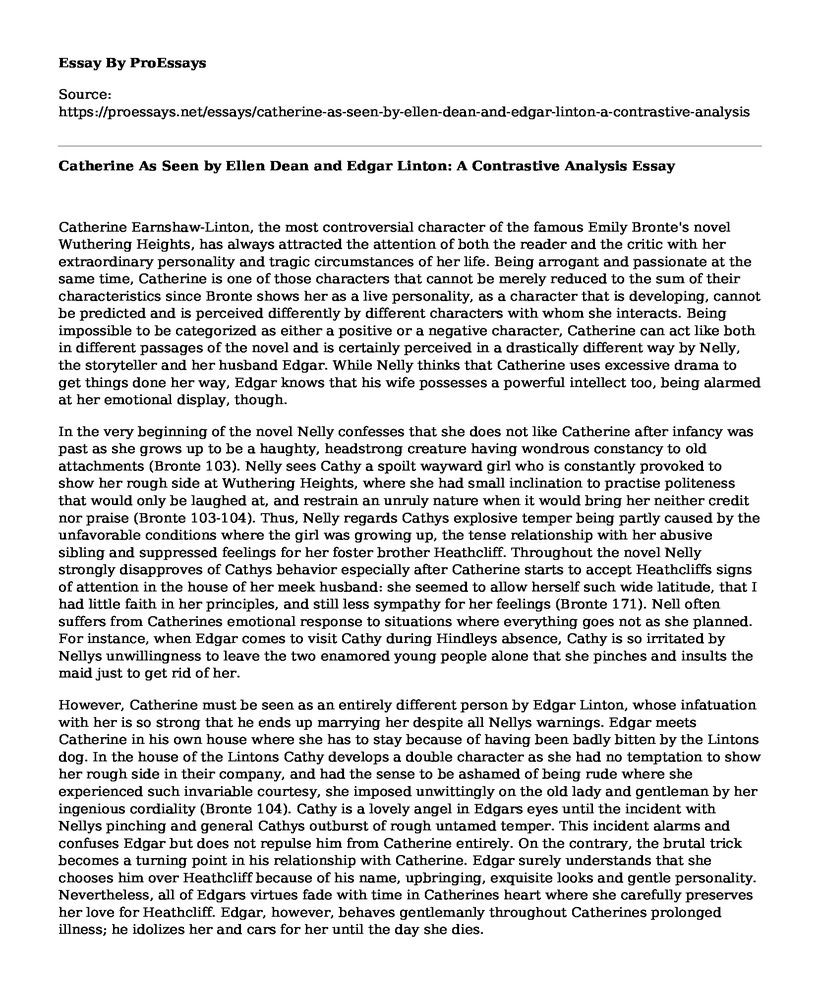Catherine Earnshaw-Linton, the most controversial character of the famous Emily Bronte's novel Wuthering Heights, has always attracted the attention of both the reader and the critic with her extraordinary personality and tragic circumstances of her life. Being arrogant and passionate at the same time, Catherine is one of those characters that cannot be merely reduced to the sum of their characteristics since Bronte shows her as a live personality, as a character that is developing, cannot be predicted and is perceived differently by different characters with whom she interacts. Being impossible to be categorized as either a positive or a negative character, Catherine can act like both in different passages of the novel and is certainly perceived in a drastically different way by Nelly, the storyteller and her husband Edgar. While Nelly thinks that Catherine uses excessive drama to get things done her way, Edgar knows that his wife possesses a powerful intellect too, being alarmed at her emotional display, though.
In the very beginning of the novel Nelly confesses that she does not like Catherine after infancy was past as she grows up to be a haughty, headstrong creature having wondrous constancy to old attachments (Bronte 103). Nelly sees Cathy a spoilt wayward girl who is constantly provoked to show her rough side at Wuthering Heights, where she had small inclination to practise politeness that would only be laughed at, and restrain an unruly nature when it would bring her neither credit nor praise (Bronte 103-104). Thus, Nelly regards Cathys explosive temper being partly caused by the unfavorable conditions where the girl was growing up, the tense relationship with her abusive sibling and suppressed feelings for her foster brother Heathcliff. Throughout the novel Nelly strongly disapproves of Cathys behavior especially after Catherine starts to accept Heathcliffs signs of attention in the house of her meek husband: she seemed to allow herself such wide latitude, that I had little faith in her principles, and still less sympathy for her feelings (Bronte 171). Nell often suffers from Catherines emotional response to situations where everything goes not as she planned. For instance, when Edgar comes to visit Cathy during Hindleys absence, Cathy is so irritated by Nellys unwillingness to leave the two enamored young people alone that she pinches and insults the maid just to get rid of her.
However, Catherine must be seen as an entirely different person by Edgar Linton, whose infatuation with her is so strong that he ends up marrying her despite all Nellys warnings. Edgar meets Catherine in his own house where she has to stay because of having been badly bitten by the Lintons dog. In the house of the Lintons Cathy develops a double character as she had no temptation to show her rough side in their company, and had the sense to be ashamed of being rude where she experienced such invariable courtesy, she imposed unwittingly on the old lady and gentleman by her ingenious cordiality (Bronte 104). Cathy is a lovely angel in Edgars eyes until the incident with Nellys pinching and general Cathys outburst of rough untamed temper. This incident alarms and confuses Edgar but does not repulse him from Catherine entirely. On the contrary, the brutal trick becomes a turning point in his relationship with Catherine. Edgar surely understands that she chooses him over Heathcliff because of his name, upbringing, exquisite looks and gentle personality. Nevertheless, all of Edgars virtues fade with time in Catherines heart where she carefully preserves her love for Heathcliff. Edgar, however, behaves gentlemanly throughout Catherines prolonged illness; he idolizes her and cars for her until the day she dies.
Works Cited
Bronte, Emily. Wuthering Heights. 1st ed. 2016. Web. 28 June 2016.
Cite this page
Catherine As Seen by Ellen Dean and Edgar Linton: A Contrastive Analysis. (2021, Mar 19). Retrieved from https://proessays.net/essays/catherine-as-seen-by-ellen-dean-and-edgar-linton-a-contrastive-analysis
If you are the original author of this essay and no longer wish to have it published on the ProEssays website, please click below to request its removal:
- The Man Who Couldn't Dance by Jason Katims Essay
- The Razor Edge Analysis Essay Example
- Literary Analysis Essay on Young Goodman Brown
- The Representation of Russia and Russians in Ninotchka and From Russia With Love Essay
- Essay Example on Themes in Literary Works: Major vs. Minor
- Essay on Aylmer's Obsession: Nathaniel Hawthorne's 'The Birthmark'.
- Paper Example on True Love: Exploring Shakespeare's Iconic Sonnet 116







